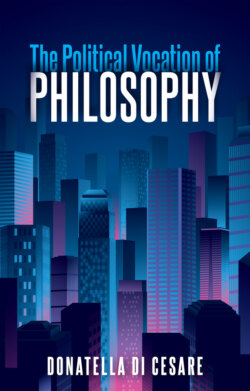The Political Vocation of Philosophy

Реклама. ООО «ЛитРес», ИНН: 7719571260.
Оглавление
Donatella Di Cesare. The Political Vocation of Philosophy
CONTENTS
Guide
Pages
The Political Vocation of Philosophy
1 The saturated immanence of the world
Notes
2 Heraclitus, wakefulness and the original communism
Notes
3 The narcosis of light: on the night of capital
Notes
4 The pólis: a calling
5 Wonder – a troubled passion
Notes
6 Between heavens and abysses
Notes
7 Socrates’ atopia
Notes
8 A political death
Notes
9 Plato – when philosophy headed into exile within the city
Notes
10 Migrants of thought
Notes
11 ‘What is philosophy?’
Notes
12 Radical questions
Notes
13 The out-of-place of metaphysics
Notes
14 Dissent and critique
Notes
15 The twentieth century: breaks and traumas
Notes
16 After Heidegger
Notes
17 Against negotiators and normative philosophers
Notes
18 Ancilla democratiae: a dejected return
Notes
19 The poetry of clarity
Notes
20 Potent prophecies of the leap: Marx and Kierkegaard
Notes
21 The ecstasy of existence
Notes
22 For an exophilia
Notes
23 The philosophy of awakening
Notes
24 Fallen angels and rag-pickers
Notes
25 Anarchist postscript
Notes
Bibliography
Index. A
B
C
D
E
F
G
H
I
J
K
L
M
N
O
P
Q
R
S
T
U
V
W
X
Z
POLITY END USER LICENSE AGREEMENT
Отрывок из книги
Donatella Di Cesare
Translated by David Broder
.....
It is no mystery that the discourse on the ‘end of the world’ is taken so seriously.6 Such discourse takes its cue above all from the empirical sciences: climatology, geophysics, oceanography, biochemistry, ecology. Humanity’s fall into catastrophe seems imminent. The near future – unforeseeable because it is completely other – is instead consigned to the scenarios portrayed in filmic drama or messianic visions. The Promethean cry risks being suffocated in an apocalyptic death-rattle. What is, at least, clear is that the late-capitalist world is the world of planet-wide ecological collapse. The fusion between techno-economy and biosphere is plain for all to see.7
‘Anthropocene’ is the name for that geological epoch in which humans look on near-impotently at the devastating and deadly effects of this asymmetrical fusion, in which nature has been eroded to the point of disappearance. Yet, the violence of this intrusion would not have been possible without the implacable, incandescent sovereignty of capital. But, in the contemporary imaginary, it seems easier to imagine the end of the world than the end of capitalism. Here lies the enormous discrepancy between scientific understanding and political impotence. At this point, capitalism has occupied the entire horizon of the thinkable. And it has done so by absorbing every hotbed of resistance within the imagination, by erasing every exteriority prior or posterior to its own history. It is as if before capitalism there was only the gloom of the archaic; after it, only the darkness of the apocalypse.
.....